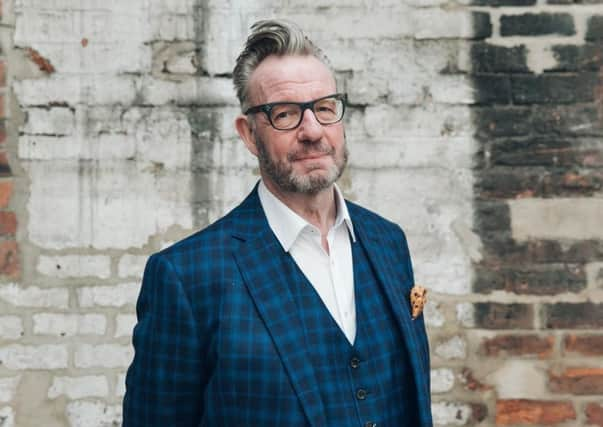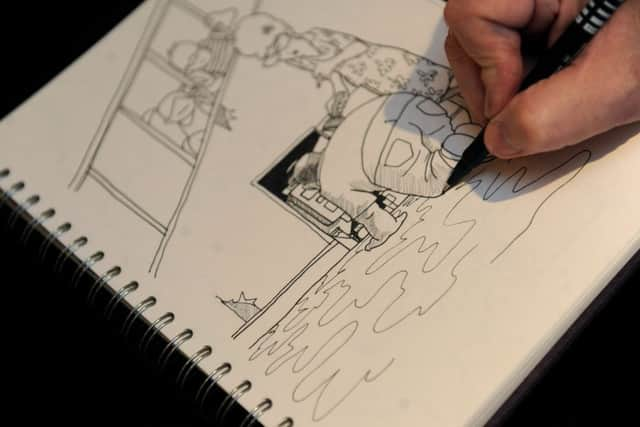After a life-saving liver transplant, artist Pete McKee on his new collection celebrating the working classes


The Sheffielder only became a full-time artist at the age of 40, quitting his job at Tesco to attempt to make a professional career from his self-taught creative work.
Now 52, McKee is back with his first major exhibition in two years following a lifesaving liver transplant centred on a theme close to his heart; celebrating working-class life. This Class Works will run for 16 days in Sheffield this summer and will see McKee collaborating with fellow artists, filmmakers and photographers.
Advertisement
Hide AdAdvertisement
Hide AdMcKee says the show is intended to address the imbalance of unfair perceptions about the working-class as “lazy, selfish, needy, ignorant, intolerant, worthless and the cause of all society’s problems”. He says that unfair narrative has become particularly prevalent following the Brexit vote, which he feels has unfairly been laid at their door for supposedly not understanding the issues.


“I got a bit annoyed by how the working class were being represented and being blamed for the result,” he says. “Working-class was like a dirty word. Whatever your views on the result, and in my family there were people who voted both ways, I was just annoyed the working class was getting a bit of a hammering.
“I wanted to make it a positive subject and show the positivity of being working-class, where everybody is fighting for each other.
“I use my personal experiences first as a springboard; once I have a subject then I draw on my own memory bank about how the subject affected me growing up.”
Advertisement
Hide AdAdvertisement
Hide AdIt may be a big topic, but McKee is a man who knows his subject inside out. Growing up on a Sheffield council estate in the 1960s and 1970s and raised by his steelworker father after his mum died when he was around seven, McKee has gone on to be a keen observer of working-class life in Yorkshire.


He says he knew from a young age he wanted to pursue a creative life; something that proved easier in theory than practice for many years.
“The first realisation of what I wanted to do was when I was 10 looking at comics like the Beano and the Dandy. My dad read the Mirror and I would read the comic strips, things like Andy Capp.
“I just wanted to be a cartoonist and that was that. At school, I used to draw people like Edward Heath. That was the only thing I got praised for, I was terrible academically. I was bottom of the reading and writing groups but the only thing that really shone for me was art.
Advertisement
Hide AdAdvertisement
Hide Ad“I always thought I would make a living doing something creative. I was in bands, thinking I was a couple of years away from being on Top of the Pops.
“That didn’t happen and I had to go to the other love of my life which is art. I would draw cartoons for newspapers and magazines and greeting card companies but never make enough to turn it into a full-time job.
“I tried to make a living as an artist but worked full-time and part-time alongside it. Payday loans were my life. In 2005, I started to paint rather than draw, started to do little exhibitions and sell things. It got to a point where I had got about £2,000 from a few I had just done, then with some commissions I had about £7,000 coming in.”
Having a wife and three children – two stepsons and one son – to consider meant it was a big decision to leave behind his steady job at Tesco, but, encouraged by his wife Jane, he decided to make the leap.
Advertisement
Hide AdAdvertisement
Hide Ad“Handing in my notice was liberating, it was fantastic. I knew for the next six months I had a chance, I could concentrate fully on creating work and doing a show and seeing if I could make money. I wasn’t going to be any more skint than we already had been!”
He adds: “I never take what I do for granted and the money I have made from it. It could be tomorrow I sell my last painting and I could be back at Tesco.
“Making a living out of being creative is not the most secure job. That is why I do big shows and keep working.”
In the years since, his career has gone from strength to strength, with his art exhibitions attracting thousands of visitors, opening a pop-up shop in London and working with musicians including Noel Gallagher, Arctic Monkeys and Richard Hawley.
Advertisement
Hide AdAdvertisement
Hide AdDesigner Paul Smith approached him in 2011 to create a selection of images to commemorate 20 years since opening his first store in Japan and McKee has subsequently gone to design several T-shirts for Smith.
But in 2014, his life began to change dramatically once again. McKee discovered he had both cirrhosis and a genetic condition called alpha anti-trypsin disorder which affects the liver. “The diagnosis came as a massive shock. I had been walking around all my life without the knowledge my liver could fail. I just couldn’t understand it or believe it,” he says.
Despite the illness and associated problems gradually taking a greater and greater toll on his health, affecting his brain and with it his emotions and speech, McKee pressed on with work; inspired by friend Sheffield music photographer Shaun Bloodworth who was also suffering with liver problems and in need of a transplant.
“I just worked tirelessly because I didn’t know if I would get a chance again. I felt all I was doing was creating a legacy and I was determined not to stop working.
Advertisement
Hide AdAdvertisement
Hide Ad“When you are driven, you push things to the side and just go for it. With liver disease, it doesn’t stop your ability to lose use your hands. Whenever I could get to the easel, I would work. I would be exhausted after two hours and would have to have a sleep because it affects your concentration.”
Unlike McKee, who underwent a successful liver transplant last year, Bloodworth passed away in 2016 after suffering infections while waiting for his operation.
“Shaun’s attitude when he was ill to life and work was so inspiring – it was positivity and determination. He wanted to keep working right until the very end. I remember visiting him in hospital and his laptop was on his lap, I couldn’t help but be inspired by that.”
McKee says his own survival has put life in fresh perspective. “If I hadn’t had the transplant, I would be very close to death now if not dead. You don’t get a transplant unless you need it.
Advertisement
Hide AdAdvertisement
Hide Ad“I don’t think you get stressed too much about things in life as you would have done in the past. You have a reality check about what is important.
“But I also think you get a bit bolshier – I used to feel I could never say ‘no’ to people. But now you realise life is too short.”
He says his aim is for people to leave inspired about their own lives and communities. “I want people to come away feeling proud, to feel heard and included.
“I’m trying not to make the show about politics, I don’t want people to think it will be like turning up to a Labour Party conference. But it is about the story of the working-class at work, rest and play and redressing that balance of it getting a hammering. I want some positivity.”
■ Tickets, which are for a two hour time slot, are on sale now for the exhibition at the 92 Burton Road warehouse between July 14 and 29 by calling 0114 263 1000 or visiting www.petemckee.com.